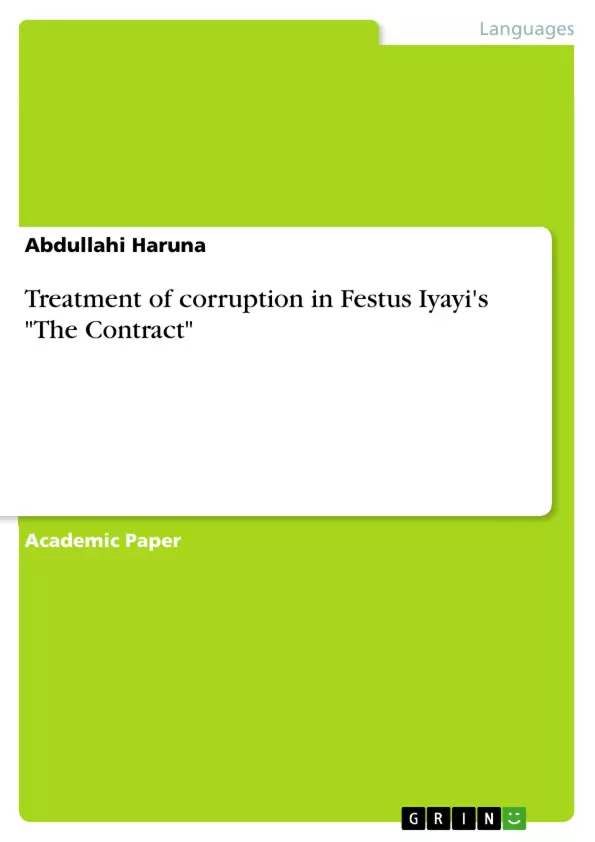Corruption has been considered endemic to Nigeria. How do Nigerian literary artists depict this social illness in their literary works? This article examines the treatment of corruption in Iyayi’s "The Contract". The discourse focuses on the social levels at which corruption is manifested and the effects of corruption on individuals and the society as depicted in the novel.
The results will indicate that the novel exposes some identified social ills which become endemic when political and institutional leaders put aside their responsibilities of nation building and succumb to the lure of lucre. Specifically, the leaders depicted in this novel use the awards of contracts ostensibly for nation building as blinds for corrupt self-enrichment and embezzlements of public funds.
Inhaltsverzeichnis (Table of Contents)
- Introduction
- The Treatment of Corruption in Iyayi's The Contract
- Summary and Conclusion
- Bibliography
Zielsetzung und Themenschwerpunkte (Objectives and Key Themes)
This article aims to analyze the portrayal of corruption in Festus Iyayi's novel, The Contract, focusing on how corruption is depicted at different social levels and its effects on individuals and society. The study seeks to highlight Iyayi's implicit desire for social change by exposing the corrupt practices of political and institutional leaders in Nigeria.
- Corruption as a pervasive social ill in Nigeria
- The role of political and institutional leaders in perpetuating corruption
- The impact of corruption on individuals and the society
- The use of contract awards as a tool for corrupt self-enrichment
- Iyayi's call for social reform and redress of the corruption problem
Zusammenfassung der Kapitel (Chapter Summaries)
The introduction sets the context for the study by exploring the relationship between literature and society, particularly the reflection of societal concerns in African literature. It highlights the post-independence realities of corruption and misgovernance in Africa, with a focus on Nigerian leadership and the subsequent impact on the common man. The article acknowledges the efforts of Nigerian novelists in tackling these issues through their works, mentioning notable examples such as Soyinka and Achebe.
The section on "The Treatment of Corruption in Iyayi's The Contract" delves into the novel's depiction of corruption. It analyzes the portrayal of corrupt officials across various sectors, including the executive council, civil services, military, and academia. The novel focuses on the widespread corruption within the executive council, where contracts awarded for national development are utilized as a cover for embezzlement and personal enrichment. Iyayi's intention, through the stark reality presented in the novel, is to raise awareness about the situation and encourage positive change.
Schlüsselwörter (Keywords)
The key themes and concepts explored in this article include corruption in Nigeria, political and institutional leadership, societal impact of corruption, contract awards as a tool for embezzlement, and the call for social reform and redress. The article focuses on the novel The Contract by Festus Iyayi as a primary source for understanding the complexities of corruption in Nigerian society.
- Quote paper
- Abdullahi Haruna (Author), 2008, Treatment of corruption in Festus Iyayi's "The Contract", Munich, GRIN Verlag, https://www.grin.com/document/470746



